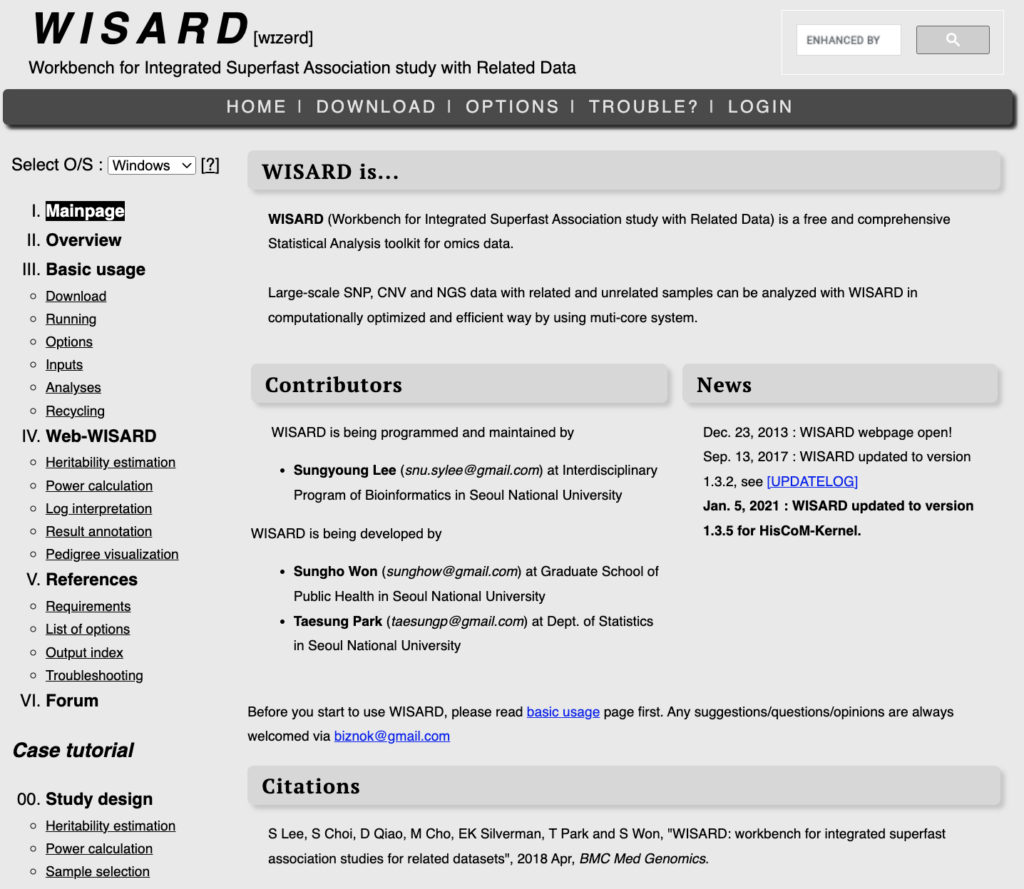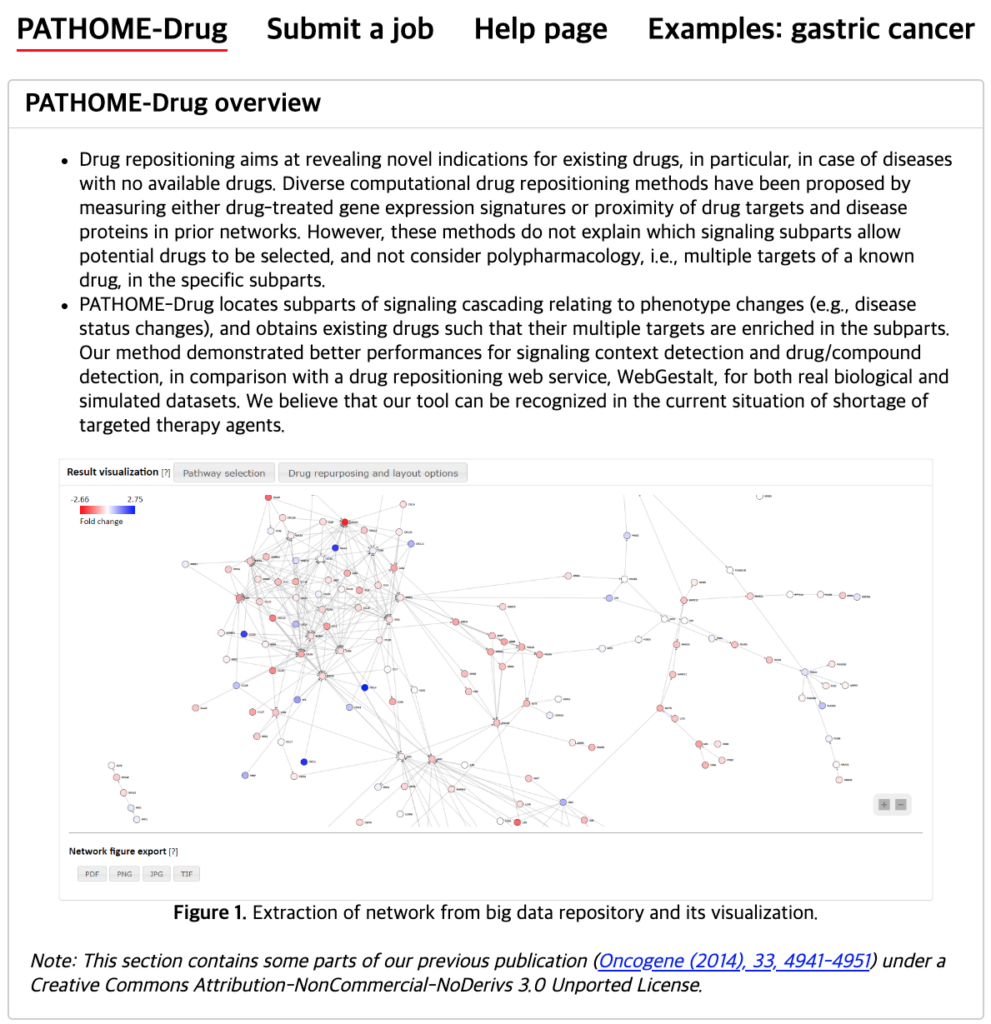
Author: admin
pathome
ENPP
ENPP is an algorithm that reduces permutation times via pruning of insignificant markers, when the markers satisfy pre-defined pruning conditions. Consequently, it can obtain significant markers in a feasible time, even for data sets with large numbers of features such as GWAS SNP data sets.
Detailed algorithm is described in the below original article, “Enhanced Permutation Tests via Multiple Pruning, Front Genet. 2020 Jun 25;11:509. doi: 10.3389/fgene.2020.00509.”
Download
An example R script is linked to: here
QTest
Introduction
This website provides R source files for implementation of the numerical study in the manuscript that will be presented in ECCB 2016, titled “Gene-Set Association Test for Next-Generation Sequencing Data.”.
Usage
The following source codes are included:
QTest_code.R.R —— List all functions needed.
n.log10.minp.1e09.txt —– Background distribution of Q-Test statistic. This file is required to execute Q-Test, and should be placed in the same directory with R code or your working directory of R.
For detail, please see the R codes.
Download
You can download a zipped file contains source codes here:
LPEseq
LPEseq: Local-pooled-error test for RNA Sequencing experiments with a small number of replicates
– Version: Release (0.01)
– Written in R script (R-2.15)
– No package dependencyEstimate gene-specific variance specially when no replicate RNA-Seq data is available and test for differential expression based on local pooled error.
Author:
Jungsoo Gim <jgim80@snu.ac.kr>
Sungho Won <won1@snu.ac.kr>
Taesung Park <tspark@stats.snu.ac.kr>
Maintainer: Jungsoo Gim <jgim80@snu.ac.kr>
Any comments will be welcome.
To install this package, start R and enter:
> source(“http://bibs.snu.ac.kr/software/LPEseq/LPEseq.R”)
> install.packages(“LPEseq_version.tar.gz”, repos=NULL, type=”source”))
Documentation
LPEseq manuscript LPEseq manuscript including detailed methods
LPEseq supplementary LPEseq online supplementary
source manual Description of functions included in “LPEseq” package
usage manual Exercise with an example script
Download
LPEseq R package-the lastest version
Citation:
Jungsoo Gim, Sungho Won, Taesung Park, (2016) PLoS ONE
cLPDseq
——————————————————————————————————————————-———————
CONDITIONAL ESTIMATION OF LOCAL POOLED DISPERSION PARAMETER IN SMALL-SAMPLE RNA-SEQ DATA IMPROVES DIFFERENTIAL EXPRESSION TEST
– Version: Release (0.01)
– Written in R script
– Package dependency: edgeRA method for differential analysis of count data, using conditional estimation of local-pooled dispersion parameters.
Author:
Jungsoo Gim <jgim80@snu.ac.kr>
Sungho Won <won1@snu.ac.kr>
Taesung Park <tspark@stats.snu.ac.kr>
Maintainer: Jungsoo Gim <jgim80@snu.ac.kr>
Any comments will be welcome.
——————————————————————————————————————————-———————
INTRODUCTION
cLPDseq is based on edgeR. To use cLPDseq functions for differential expression analysis, edgeR package should be first installed.
> install.packages(“edgeR”)
> library(edgeR)
Once edgeR is installed, you can use cLPDseq functions by downloading it from the link below, or by directly typing
> source(“http://statgen.snu.ac.kr/software/cLPDseq/cLPDseq.R”)
Followings are a typical example of DE analysis using edgeR (please see the edgeR manual for further details)
> counts <- matrix(rnbinom(1000, mu=runif(10, 1, 1000), size=0.1), ncol=4)
> group <- factor(c(1,1,2,2))
> dge <- DGEList(counts=counts, group=group)
> dge <- calcNormFactors(dge)
> dge <- estimateCommonDisp(dge)
> dge <- estimateTagwiseDisp(dge)
> res <- exactTest(dge)
> res <- topTags(res)
Since the cLPDseq functions take the DGEList object, one can easily evaluate the local-pooled dispersion by typing,
> dge <- estimatePooledDisp
Note that estimatePooledDisp() is the cLPDseq function evaluating local pooled dispersion descripbed in our manuscript. Thus, the cLPEseq R script (cLPDseq.R) should have been read to perform the analysis.
cLPDseq.R script overwrites exactTest() to incorporate pooled dispersion into DEG test. The exact test for cLPDseq can be conducted by giving a proper argument,
> rescLPD <- exactTest(dge, dispersion=”lpd”)
See and compare p-values obtained by original edgeR method and cLPD method
> pvals <- cbind(red$table[,3], rescLPD$table[,3])
> plot(pvals, xlab=”edgeR”, ylab=”cLPDseq”)
——————————————————————————————————————————-———————
Download
cLPDseq manuscript Published cLPDseq manuscript
source code A script file including functions evaluating conditional local pooled dispersion (cLPD) and DEG testing upon cLPD
——————————————————————————————————————————-———————
Citation:
Jungsoo Gim, Sungho Won, Taesung Park (2016) CONDITIONAL ESTIMATION OF LOCAL POOLED DISPERSION PARAMETER IN SMALL-SAMPLE RNA-SEQ DATA IMPROVES DIFFERENTIAL EXPRESSION TEST, Journal of Bioinformatics and Computational Biology, accepted
FARVATX
WISARD

WISARD (Workbench for Integrated Superfast Association study with Related Data) is a free and comprehensive Statistical Analysis toolkit for omics data.
Large-scale SNP, CNV and NGS data with related and unrelated samples can be analyzed with WISARD in computationally optimized and efficient way by using muti-core system.

